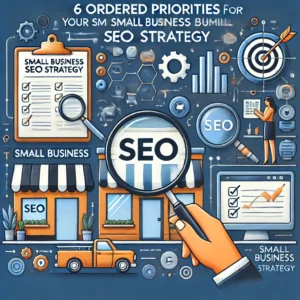SEO Priorities For Small Business
6 Ordered Priorities for Your Small Business SEO Strategy
Hey, DIY SEO Show listeners! Jeremy Poland here, and today we’re tackling the often overwhelming world of SEO. In the sea of digital marketing advice, it’s easy to get lost. So, I’m here to give you a clear, prioritized list of SEO activities to focus on.
1. Backlink Building: The SEO Horsepower
Think of backlinks as votes of confidence for your website. They signal to Google that your site is reputable and worthy of higher rankings. Most businesses I encounter lack backlinks, so starting here can have a significant impact. Building profiles on directories, setting up social media, and connecting with relevant websites are all part of the process. A few quality backlinks can immediately improve your keyword rankings, setting the foundation for long-term success.
2. On-Site SEO: The Website Tune-Up
This is a one-time fix that can make a big difference. On-site SEO involves optimizing your website’s technical aspects, like page load speed, image sizes, and meta tags. For smaller websites, it’s a quick and easy win. You can even hire a freelancer to handle it for a small fee.
3. Competitor Research: Know Your Playing Field
To outrank your competitors, you need to understand their strengths and weaknesses. Paid tools can help you analyze their domain authority and backlinks. Once you have this data, you can strategize and tailor your approach accordingly.
4. Keyword Research: Speak Your Customer’s Language
What terms are your potential customers searching for? Keyword research reveals these insights, allowing you to create content that aligns with their needs and interests. This step helps you attract the right audience to your website.
5. Content Strategy: Fill the Gaps
Once you know your target keywords, it’s time to develop a content strategy. Identify the missing pieces of content on your site—the “content gap”—and create blog posts or pages that address those topics. This will attract more organic traffic and improve your rankings for relevant keywords.
6. Ongoing Backlink Building and Content Production: The SEO Marathon
SEO is a marathon, not a sprint. To maintain and improve your rankings, you need to consistently build high-quality backlinks and create valuable content. This keeps your website fresh and relevant in the eyes of both users and search engines.
In Summary
By following this prioritized list, you can streamline your SEO efforts and achieve tangible results. Remember, it’s a journey, but with dedication and the right guidance, you can conquer the search engine rankings. If you’re ready to take your SEO to the next level, join the DIY SEO community and gain access to valuable resources and expert support.
Thanks for listening, and see you in the next episode!




